Daily Vocabulary Words: List of Daily Used Words in Leading International Newspapers
Hi there. Welcome to this special section @ Wordpandit.
Our endeavour here is very simple: to highlight important daily vocabulary words, which you would come across in leading newspapers in the country. We have included the following newspapers in our selection:
• The New York Times
• The Washington Post
• Scientific American
• BBC
• The Guardian
• Psychology Today
• Wall Street Journal
• The Economist
We are putting in extensive work for developing your vocabulary. All you have got to do is be regular with this section and check out this post on a daily basis. This is your repository of words that are commonly used and essentially, we are posting a list of daily used words. Hence, this has significant practical application as it teaches you words that are used commonly in leading publications mentioned above.
Visit the website daily to learn words from leading international newspapers.
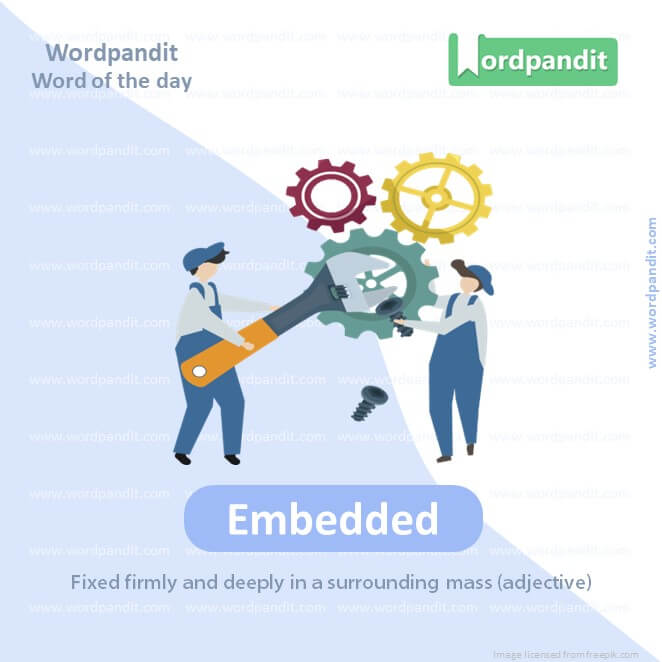
WORD-1: Embedded
CONTEXT: There’s a subtle but important legal point embedded here as well. As Pan noted, the interchange revealed an inherent weakness in Trump’s argument.
SOURCE: Washington Post
EXPLANATORY PARAGRAPH: Imagine you press a small toy into a piece of clay, and it stays stuck inside. When something is “embedded,” it means it’s firmly fixed into something else and becomes part of it, just like the toy in the clay.
MEANING: Fixed firmly and deeply in a surrounding mass (adJective).
PRONUNCIATION: em-BED-ed
SYNONYMS: implanted, ingrained, entrenched, inserted, embedded
USAGE EXAMPLES:
1. The journalist was embedded with the troops during the conflict.
2. She found a piece of glass embedded in the tire.
3. The spy had been embedded within the organization for years.
4. The values were deeply embedded in the culture.
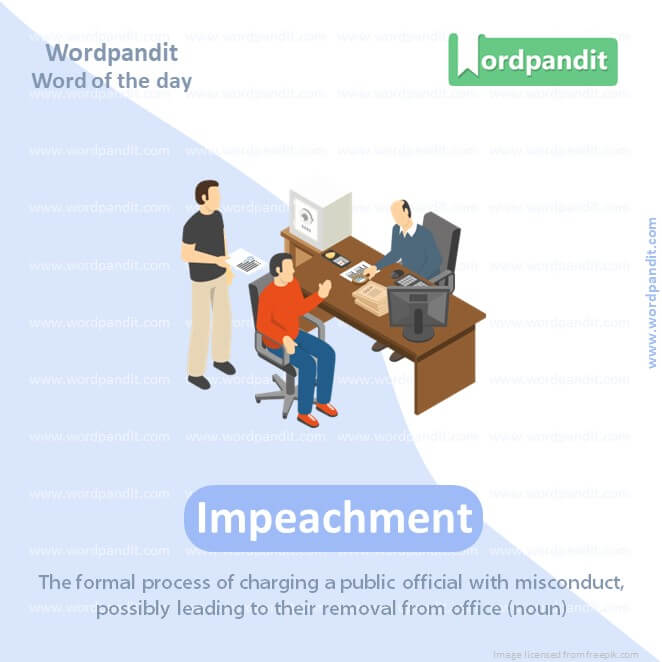
WORD-2: Impeachment
CONTEXT: New York criminal investigation, that Trump enjoyed only “temporary presidential immunity,” while in office; in the second impeachment trial, that Trump could be criminally charged and so didn’t need to be convicted.
SOURCE: Washington Post
EXPLANATORY PARAGRAPH: Imagine if a class leader was not being fair or kind, and the class decided that someone else should be the leader. “Impeachment” is something like that but for important leaders, like presidents. It’s a way of saying they might have done something wrong, and they might have to stop being the leader.
MEANING: The formal process of charging a public official with misconduct,
possibly leading to their removal from office (noun).
PRONUNCIATION: im-PEECH-muhnt
SYNONYMS: accusation, indictment, charge, arraignment, prosecution
USAGE EXAMPLES:
1. The impeachment of the president was a major historical event.
2. She studied the impeachment process in her civics class.
3. The governor faced impeachment for corruption.
4. The impeachment proceedings were broadcast live on television.
WORD-3: Flickered
CONTEXT: The needles have flickered but not moved much for over a year.
SOURCE: Guardian
EXPLANATORY PARAGRAPH: Imagine a candle flame dancing lightly when there’s a gentle breeze. When the light from the candle “flickers,” it means it’s moving back and forth quickly and looks like it’s almost going out but then comes back.
MEANING: Shine with a light that is sometimes bright and sometimes weak (verb).
PRONUNCIATION: FLIK-erd
SYNONYMS: blinked, flashed, fluttered, twinkled, shimmered
USAGE EXAMPLES:
1. The lights flickered during the storm.
2. Hope flickered in his heart despite the challenges.
3. The flame flickered in the wind.
4. Her interest in the topic flickered but never fully died.
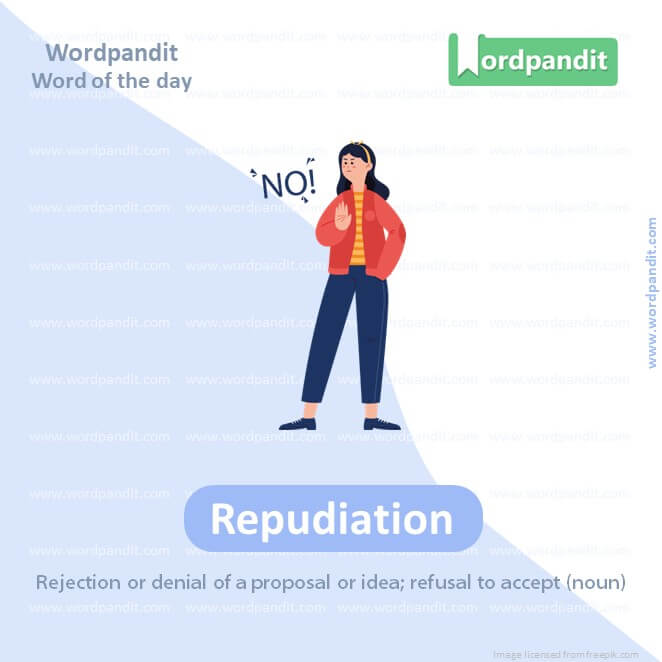
WORD-4: Repudiation
CONTEXT: That doesn’t make his method infallible, but its repudiation has proved to be a reliable route to defeat.
SOURCE: Guardian
EXPLANATORY PARAGRAPH: Imagine if you made a promise to swap sandwiches with a friend, but then you decide you don’t want to do it anymore. “Repudiation” is when someone says no to something they once agreed to or said they would do.
MEANING: Rejection or denial of a proposal or idea; refusal to accept (noun).
PRONUNCIATION: re-pew-DEE-ay-shun
SYNONYMS: rejection, denial, disavowal, renunciation, refusal
USAGE EXAMPLES:
1. His repudiation of the agreement caused a lot of problems.
2. The theory’s repudiation was controversial among scientists.
3. She expressed her repudiation of the old policies.
4. The repudiation of their support left the project in jeopardy.
WORD-5: Perversion
CONTEXT: It is especially so when the pitch is skewed by a cultural habit of treating Conservative rule as Britain’s default setting – the norm from which Labour is a deviation, tending to perversion.
SOURCE: Guardian
EXPLANATORY PARAGRAPH: Imagine someone playing a game but changing the rules so they can win every time. “Perversion” is when something is changed from its original purpose or use, especially in a way that is not good or is wrong.
MEANING: The alteration of something from its original course, meaning, or state to a distortion or corruption of what was first intended (noun).
PRONUNCIATION: per-VER-zhun
SYNONYMS: distortion, corruption, twisting, misrepresentation, alteration
USAGE EXAMPLES:
1. The perversion of the original idea led to many issues.
2. He was accused of moral perversion.
3. The document had undergone perversion to serve selfish interests.
4. They discussed the perversion of science for harmful purposes.
WORD-6: Averting
CONTEXT: The exceptional quality of Blair’s record is the straw at which Rishi Sunak clutches in hope of averting electoral catastrophe.
SOURCE: Guardian
EXPLANATORY PARAGRAPH: Imagine you and your friend are playing with a ball in the park, and it starts to roll towards the street. If you quickly grab it before it goes into the road, you are “averting” a possible accident. It means to prevent something bad from happening by taking quick action.
MEANING: Turn away or prevent (something bad) from happening (verb).
PRONUNCIATION: uh-VURT-ing
SYNONYMS: preventing, avoiding, stopping, warding off, deflecting
USAGE EXAMPLES:
1. She succeeded in averting a crisis at work with quick thinking.
2. His quick reflexes averted an accident.
3. Efforts to avert environmental disaster are ongoing.
4. The government introduced new measures aimed at averting economic decline.
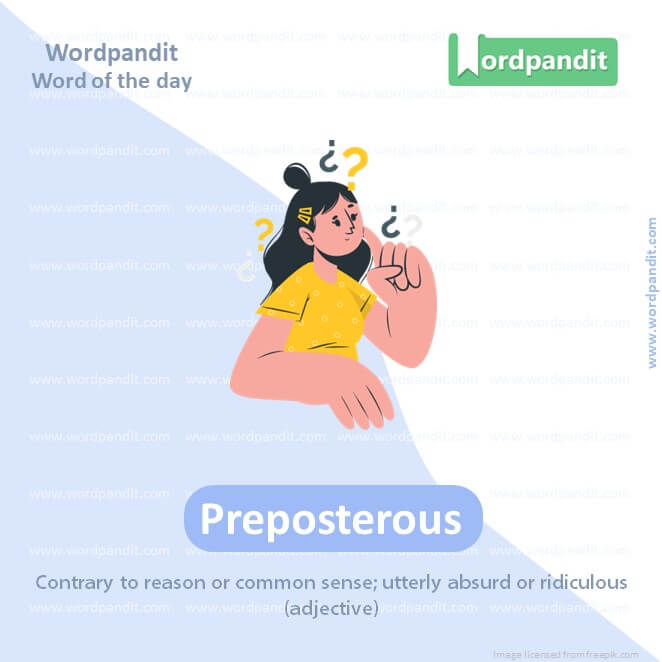
WORD-7: Preposterous
CONTEXT: Pleading for continuity in volatile times is probably the best campaign available to Sunak, which is to say the only one that isn’t preposterous given that his party has been in power for the past 14 years.
SOURCE: Guardian
EXPLANATORY PARAGRAPH: Imagine someone telling you that a tiny ant can lift an entire car. That idea seems so silly and impossible, right? When something is “preposterous,” it means it is so ridiculous or silly that it’s hard to believe.
MEANING: Contrary to reason or common sense; utterly absurd or ridiculous (adjective).
PRONUNCIATION: pre-POS-tuh-rus
SYNONYMS: absurd, ridiculous, ludicrous, foolish, laughable
USAGE EXAMPLES:
1. The idea of living on the sun is preposterous.
2. He dismissed the conspiracy theories as preposterous.
3. The charges against her were preposterous and easily disproved.
4. Their plan sounds preposterous, but it just might work.
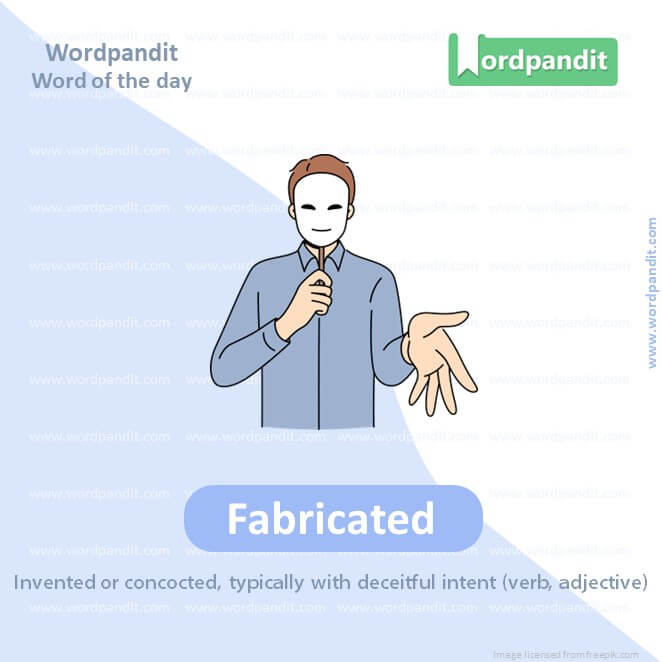
WORD-8: Fabricated
CONTEXT: The relevance to today’s circumstances is tenuous but not entirely fabricated.
SOURCE: Guardian
EXPLANATORY PARAGRAPH: Imagine you are telling a story about a dragon, but there really isn’t any dragon—it’s all made up. When something is “fabricated,” it means it is made up or created from the imagination, not real.
MEANING: Invented or concocted, typically with deceitful intent (verb adjective).
PRONUNCIATION: FAB-ri-kay-tid
SYNONYMS: falsified, invented, concocted, made-up, counterfeit
USAGE EXAMPLES:
1. The evidence in the trial was found to be fabricated.
2. He fabricated a story about being a millionaire.
3. The rumor was completely fabricated.
4. Many details of the report were fabricated to enhance the story.
WORD-9: Snuffing
CONTEXT: There will be no premature victory rally like the one that Kinnock addressed in Sheffield the week before polling, which has entered Westminster folklore as a parable of vote-snuffing hubristic grandiosity.
SOURCE: Guardian
EXPLANATORY PARAGRAPH: Imagine blowing out a candle on your birthday cake. When you “snuff” a candle, it means you put out the flame, usually by pinching it or covering it quickly so there’s no more fire.
MEANING: Extinguish (a candle or flame) (verb).
PRONUNCIATION: SNUF-ing
SYNONYMS: extinguishing, putting out, dousing, smothering, quenching
USAGE EXAMPLES:
1. He snuffed out the candle before leaving the room.
2. The wind snuffed the flame of the campfire.
3. She snuffed out every candle in the house during the power outage.
4. Traditionally, people snuffed candles to save wax.
WORD-10: Retreading
CONTEXT: Wariness of retreading old errors gives Starmer’s approach to the election a ponderous gait, which critics interpret as morbid timidity and supporters identify as judicious pace.
SOURCE: Guardian
EXPLANATORY PARAGRAPH: Imagine you have a pair of shoes with worn-out soles, and instead of buying new shoes, you fix the soles to make them good as new. “Retreading” is similar but for tires on vehicles. It means putting new rubber on old tires so they can be used again.
MEANING: Put a new tread on (a worn tire) (verb).
PRONUNCIATION: ree-TRED-ing
SYNONYMS: refurbishing, renewing, reconditioning, restoring, revamping
USAGE EXAMPLES:
1. The company specializes in retreading old tires to make them safe again.
2. Retreading is an economical alternative to buying new tires.
3. Many bus companies save money by retreading their tires.
4. He learned about the process of tire retreading in his mechanics course.
Vocabulary Definition
Understanding a language requires a deep grasp of the ‘vocabulary definition’. These precise meanings of words shape our understanding and communication. However, to successfully learn ‘vocabulary definition’, one must do more than just memorize a dictionary. So what’s the perfect approach to assimilating ‘vocabulary definition’?
The compelling answer is context. To truly comprehend ‘vocabulary definition’, expose yourself to diverse reading materials such as books, magazines, newspapers, and digital content. This approach equips you with a practical understanding of ‘vocabulary definition’ and illuminates the nuanced ways in which they get employed in conversation and writing.
An innovative way to enhance memory while learning ‘vocabulary definition’ involves visualization. By creating a mental image representing the definition, your brain can help cement the association between the word and its meaning, improving recall capability significantly.
Now, understanding and retaining ‘vocabulary definition’ is only one part of the equation. The other, equally essential part is application. Actively using these words in your personal conversations, professional communication, or social media posts will reinforce your understanding and usage of ‘vocabulary definition’.
Interactive language tools can be a great help when mastering ‘vocabulary definition’. Language-learning software and applications often provide comprehensive word definitions, examples, and even quizzes to test your learning progress.
In conclusion, the journey of embracing ‘vocabulary definition’ demands a blended approach. Diversified reading materials, visualization techniques, active application, and the leverage of modern language-learning tools together chart a pathway to mastering ‘vocabulary definition’. Remember, every word definition you conquer is a stepping stone leading you to the magnificent mansion of language proficiency. Happy learning!










